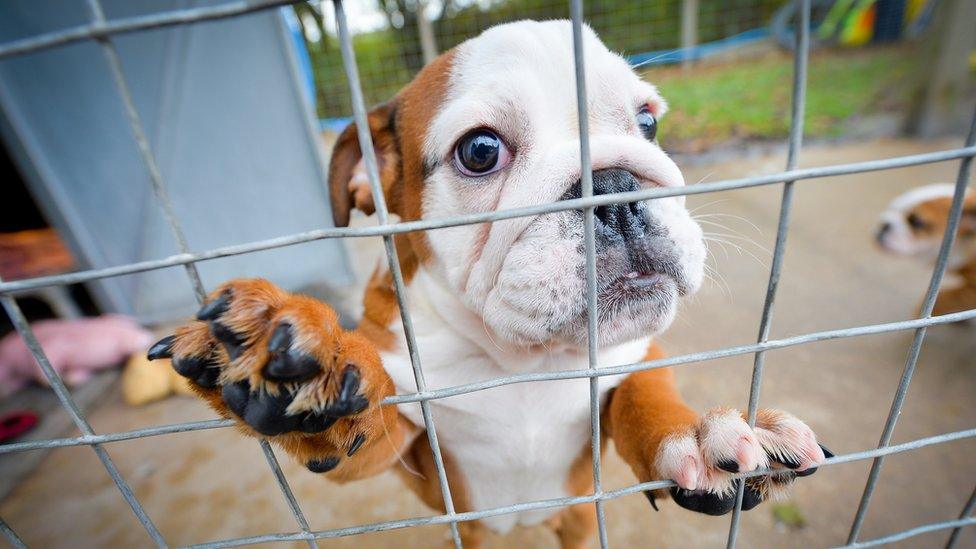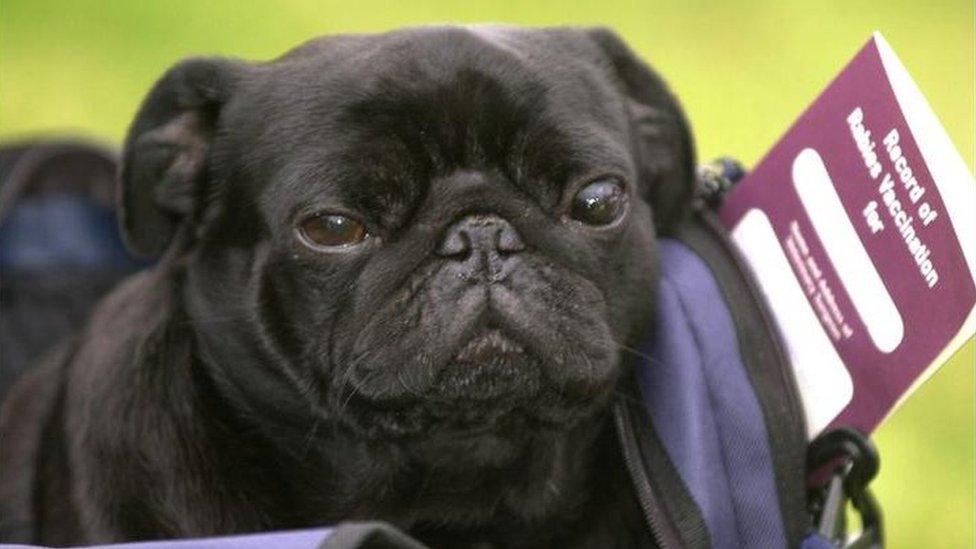Can Brexit help end puppy smuggling?
- Published

"Leaving the European Union provides us with new opportunities to deal with the illegal trade in puppies," Michael Gove declared.
How might this work, and how exactly could Brexit have an impact on puppy smuggling?
The government has been making much of its support for animal welfare recently, perhaps still smarting from the row involving animal sentience, celebrities and a "fake news" backlash.
Last week the Tories tweeted a picture of a cute puppy, promising to "fight back" against smuggling.
Part of this, according to Mr Gove - the Brexit campaigner-turned environment secretary - involves leaving the European Union.
Pet passports

In 2002 this dog was the first to travel to the UK using a pet passport
This is because charities, campaigners and MPs say the EU's pet passport scheme is being abused.
Pet passports, external are used to allow people's domestic dogs, cats and ferrets to travel freely around Europe.
They are issued by EU countries and a short list of other countries such as Greenland, Iceland and Switzerland, and enable dogs to avoid quarantine provided they have been microchipped and vaccinated against rabies.
But according to groups like the Dogs Trust and the RSPCA, puppies, often kept in horrific conditions, are being brought into the UK on fraudulent passports to be sold as pets to unsuspecting buyers.
Animal sentience: Social media reaction to fake news claims
They say the number of dogs coming to the UK under the scheme is increasing year on year and the number from Central and Eastern Europe has "rocketed" recently.
The government says it is aware of abuse of the system in some EU countries, with vets signing pet passports without the necessary checks and vaccinations.
Is it actually about Brexit?
Not entirely, according to some campaigners. The All Party Parliamentary Group on Animal Welfare says Brexit alone won't stop puppy smuggling and the forging of documents. Better enforcement at ports and tighter licensing rules are needed, it says.
But the UK leaving the EU, which is responsible for the laws governing the transport of pets around Europe, is seen as a chance to make changes.
Charities have already tabled a list of demands for the UK's departure in 2019.
According to the Dogs Trust, "exiting the EU presents a crucial opportunity to review and amend legal requirements which could not previously be changed by the UK alone".
It says the government should impose other more stringent requirements on dogs coming into the UK - like requiring a rabies test before they arrive.
The RSPCA has a similar wish list and wants the number of dogs that can be imported per person, currently five, to be reduced.
Last year a committee of MPs, external urged the government to demand reform of the pet passport scheme in the Brexit negotiations.
They said the age at which dogs are allowed to enter the UK should be increased to six months from the 15 weeks set out under the EU scheme.
Allow X content?
This article contains content provided by X. We ask for your permission before anything is loaded, as they may be using cookies and other technologies. You may want to read X’s cookie policy, external and privacy policy, external before accepting. To view this content choose ‘accept and continue’.
Allow X content?
This article contains content provided by X. We ask for your permission before anything is loaded, as they may be using cookies and other technologies. You may want to read X’s cookie policy, external and privacy policy, external before accepting. To view this content choose ‘accept and continue’.
The government says it is already working hard to tackle puppy smuggling - including on licensing and public awareness - and while it promises more action after Brexit, nothing specific has been announced yet.
Brexit negotiations are currently taking place, and - as with many other elements of the EU - we don't yet know exactly what involvement the UK will have with the pet passport scheme in years to come.
If nothing is agreed, ministers will have the option of setting up their own system once EU law no longer applies.
It's worth noting that any toughening of the pet visa rules aimed at curbing smuggling could make it harder for people to take their pets to Europe and back - which might be less popular.
What does the EU say?
Much of the debate about smuggling is a criticism of the EU's pet transport scheme.
As well as the UK campaign around Brexit, Europe-wide campaigners say a pan-EU crackdown is needed, with tougher checks at borders, visual inspection of puppies and a tightening of the pet passport requirements.
Asked about concerns its pet passport system is being abused and leading to puppies being smuggled, the European Commission's response suggested the member states themselves carried responsibility.
The national governments need to develop the "necessary tools and procedures" to test dogs being brought into their countries, to inform people of the risks of smuggling animals and to set penalties, it said.
However it did say it say it was "aware of the challenges" of organising the required checks across borders, in particular animals being disguised as family pets only to be sold commercially.
It said it had helped by training veterinary and customs officials and made it easier for countries to share intelligence about fraud.
We'll know more about how the UK will act as the Brexit negotiations move forward - the EU says puppy smuggling has not yet been raised by the UK in talks so far.

How to avoid purchasing illegal pups

Ask to see the mother and pup together
Visit the new pup, at its home, more than once and get paperwork before taking it home
Take new puppies for a veterinary health check immediately
Do not buy from anyone who can supply various breeds on demand
Do not to buy a puppy that looks underweight, or feel pressured into buying
Source: The Dogs Trust